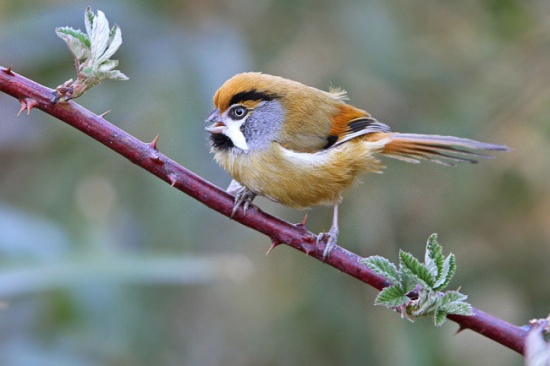(→External Links: GSearch amended to allow for scientific name variations) |
(taxonomy) |
||
| Line 20: | Line 20: | ||
Common in parts of its range. Generally more common in the Himalayas than in the east of range. | Common in parts of its range. Generally more common in the Himalayas than in the east of range. | ||
==Taxonomy== | ==Taxonomy== | ||
| − | 10 subspecies recognized which are sometimes split into 5 full species: | + | 9 to 10 subspecies recognized which are sometimes split into 5 full species: |
| − | * ''Suthora nipalensis'' - ''' | + | * ''Suthora nipalensis'' - '''Black-throated Parrotbill''' |
| − | ** ''S. n. garhwalensis'' in north [[India]] (Uttarkhand) | + | ** ''S. n. garhwalensis'' in north [[India]] (Uttarkhand) (not listed by Clements) |
** ''S. n. nipalensis'' in west and central [[Nepal]] | ** ''S. n. nipalensis'' in west and central [[Nepal]] | ||
* ''Suthora humii'' - '''Orange-eared Parrotbill''' | * ''Suthora humii'' - '''Orange-eared Parrotbill''' | ||
** ''S. n. humii'' from east [[Nepal]] to [[Bhutan]] | ** ''S. n. humii'' from east [[Nepal]] to [[Bhutan]] | ||
| − | ** ''S. n. | + | ** ''S. n. crocotius'' in east [[Bhutan]] and adjacent northeast [[India]] |
* ''Suthora poliotis'' - '''Grey-breasted Parrotbill''' | * ''Suthora poliotis'' - '''Grey-breasted Parrotbill''' | ||
** ''S. n. poliotis'' in northeast [[India]], west and north [[Burma]] and south [[China]] (Yunnan) | ** ''S. n. poliotis'' in northeast [[India]], west and north [[Burma]] and south [[China]] (Yunnan) | ||
| Line 37: | Line 37: | ||
** ''S. n. kamoli'' in south [[Laos]] and [[Vietnam]] | ** ''S. n. kamoli'' in south [[Laos]] and [[Vietnam]] | ||
This species was formerly placed in the genus ''[[:Category:Paradoxornis|Paradoxornis]]''.<br /> | This species was formerly placed in the genus ''[[:Category:Paradoxornis|Paradoxornis]]''.<br /> | ||
| + | The different checklists don't agree on the taxonomy. Clements doesn't listen ''garhwalensis'' and has ''crocotius'' (or ''crocotia'') in the ''nipalenis'' group.<br /> | ||
It was also considered conspecific with [[Golden Parrotbill]]. | It was also considered conspecific with [[Golden Parrotbill]]. | ||
==Habitat== | ==Habitat== | ||
| Line 46: | Line 47: | ||
Residents species with some altitudinal movements in cold winters. | Residents species with some altitudinal movements in cold winters. | ||
==References== | ==References== | ||
| − | #{{Ref- | + | #{{Ref-Clements6thAug17}}# {{Ref-HBWVol13}}#{{Ref-RasmussenAnderton05}}#{{Ref-GillDonsker17V7.3}} |
{{ref}} | {{ref}} | ||
==External Links== | ==External Links== | ||
Revision as of 16:03, 1 January 2018
Alternative names: Ashy-eared Parrotbill; Nepal Parrotbill; Orange Parrotbill; Orange Suthora
- Suthora nipalensis
Includes Grey-capped Parrotbill; Orange-eared Parrotbill; Grey-breasted Parrotbill; Buff-breasted Parrotbill and Black-eared Parrotbill
Identification
10cm. A very variable, tiny parrotbill.
- Tiny, blackish bill
- Black lateral crown stripe and throat-patch
- White face, short brow and moustache
- Warm brown above
- Mostly orange-rufous wings and tail with silvery and black wing-shlashes
- Grey-capped Parrotbill (see taxonomy) with grey crown and cheek and bright rufous-buff breast and flanks
- Orange-eared Parrotbill (see taxonomy) with orange-rufous ear-coverts
- Grey-breasted Parrotbill (see taxonomy) with rufous crown and grey underparts
- Buff-breasted Parrotbill (see taxonomy) with like Grey-capped with buff breast but with rufous crown
- Black-eared Parrotbill (see taxonomy) with black ear-coverts, rufous crown, whitish underparts with buff flanks
Sexes similar. Juveniles have a smaller and paleer bill and a smaller and duller throat-patch
Distribution
Found from north India east along the Himalayas to Nepal, Bhutan, northeast India, parts of Burma, south China (Yunnan), north Thailand, Laos and Vietnam.
Common in parts of its range. Generally more common in the Himalayas than in the east of range.
Taxonomy
9 to 10 subspecies recognized which are sometimes split into 5 full species:
- Suthora nipalensis - Black-throated Parrotbill
- Suthora humii - Orange-eared Parrotbill
- Suthora poliotis - Grey-breasted Parrotbill
- Suthora ripponi - Buff-breasted Parrotbill
- Suthora beaulieui - Black-eared Parrotbill
This species was formerly placed in the genus Paradoxornis.
The different checklists don't agree on the taxonomy. Clements doesn't listen garhwalensis and has crocotius (or crocotia) in the nipalenis group.
It was also considered conspecific with Golden Parrotbill.
Habitat
Bamboo and undergrowth in broadleaf evergreen, oak, rhododendron or mixed deciduous forest. Occurs at 1525 - 3300 in the Indian Subcontinent, 1200 - 2650m in southeast Asia.
Behaviour
Feeds on small insects, bamboo buds, bits of bamboo and grass seeds.
Usually seen in groups of 3 to 40 or more birds, often associated with other species like babblers. Flocks are moving very fast.
Breeding season from March to July. The nest is a tiny cup-shaped structure made of bamboo leaves and fine grasses. It's placed close to the ground in a cluster of twigs, bamboo or a thick bush. Lays 2 - 4 eggs.
Residents species with some altitudinal movements in cold winters.
References
- Clements, J. F., T. S. Schulenberg, M. J. Iliff, D. Roberson, T. A. Fredericks, B. L. Sullivan, and C. L. Wood. 2017. The eBird/Clements checklist of birds of the world: v2017, with updates to August 2017. Downloaded from http://www.birds.cornell.edu/clementschecklist/download/
- Del Hoyo, J, A Elliott, and D Christie, eds. 2008. Handbook of the Birds of the World. Volume 13: Penduline-tits to Shrikes. Barcelona: Lynx Edicions. ISBN 978-8496553453
- Rasmussen, PC and JC Anderton. 2005. Birds of South Asia: The Ripley Guide. Barcelona: Lynx Edicions. ISBN 978-8487334672
- Gill, F. and Donsker, D. (Eds). 2017. IOC World Bird Names (version 7.3). Available at http://www.worldbirdnames.org/.
Recommended Citation
- BirdForum Opus contributors. (2024) Black-throated Parrotbill. In: BirdForum, the forum for wild birds and birding. Retrieved 30 April 2024 from https://www.birdforum.net/opus/Black-throated_Parrotbill




